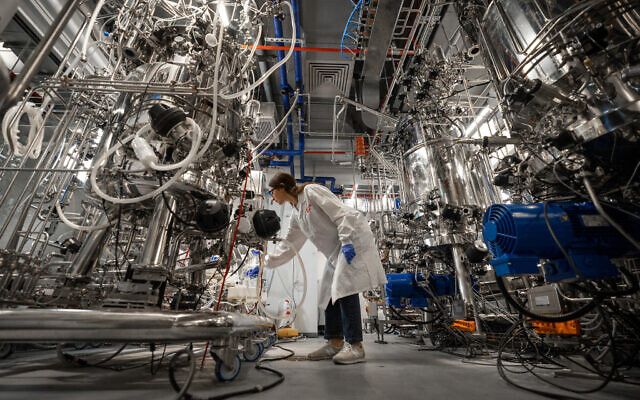Israel’s ministries of agriculture, and innovation, science and technology have earmarked 4 million shekels for a new academic grant program that will support researchers exploring new food technologies, in particular alternative. protein region.
The ministries called for proposals last Thursday with the Good Food Institute (GFI) Israel, a non-profit organization that seeks to promote research and innovation in food technology.
The holistic food tech industry is a broad sector that includes nutrition, packaging, food safety, processing systems, innovative ingredients and alternative proteins. The latter means plant-based alternatives to meat, dairy and eggs; cultured dairy, meat and seafood; insect protein; and fermentation products and processes.
Many of the technologies being used in the field are based on academic research. The technologies behind two major Israeli farmed meat companies, Aleph Farms and Future Meat, are founded on bioengineering research, supported by their respective co-founders, Technion’s Prof. Shulmit Levenberg – Prof. Israel Institute of Technology and Hebrew University. Yaakov Nahmias of Jerusalem. Both are leading academics in the tissue engineering field.
The ministry’s funding will support about a dozen academic studies that provide scientific and technological solutions in the fields of cultured meat, fermentation processes and plant-based substitutes. The ministries said the study could be aimed at improving the final product or improving the production process.
According to the announcement, priority will be given to studies with an emphasis on environmental sustainability and animal welfare.
Alla Voldmann-Rentzer, director of strategic alliances at GFI Israel, told The Times of Israel via email that submissions are open until August 1 and any breakthroughs will be available to the general public.

SavorEat’s plant-based beef burger (right) and pork breakfast sausage patty (left), served in the kitchen of the company’s office in Rehovot, November 2021. (Times of Israel Staff)
“The purpose of most public and state-funded grants is to apply open access to the principles and practice of open science, so that all research products produced as a result of the grant are available to the general public. Individual research groups and those working in this field This has a dual effect on both the entire scientific and industry community, and can benefit from the research findings,” explained Voldman-Rantzer.
“The grant is intended to fund early-stage projects and does not require an initial proof of concept. It is an alternative for new and existing scientists to take new approaches to address challenges and barriers in protein R&D and industry. There is an opportunity to explore.”
One of the obstacles is the lack of enough scientists and engineers working to develop the food technologies that will take the industry forward. Other challenges include flavor, texture, scaling, and pricing.
Voldmann-Rentzer said that GFI is “working relentlessly to identify existing and future constraints as well as address the industry’s most pressing challenges.”
“Alternative proteins are technologies that aim to recapitulate the organoleptic properties of animal-based food products using cells from plants, microorganisms, or animals,” he explained, adding that in the selection process, GFIs were prioritized “some of the most important”. likely to give. white space” which includes “improving fat biomimicry, crop optimization, seafood substitutes, and texture creation processes”.

Chicken nuggets made by Israeli cultured meat developer Future Meat. (future meat)
Earlier this year, GFI Israel published a report urging the government to together with a national strategy To support the country’s growing food tech industry if it hopes to maintain a significant role in the sector for years to come.
Part of this strategy includes supporting local industry in the form of multidisciplinary research centers, technology transfer programs (from university laboratories to industry), research grants and training, and innovation centers specific to farmed meat, plant-based proteins. would involve the creation of an infrastructure for , and fermentation technology startups.
“We need more researchers. This is very important because this field is built around academic research, which needs government funding,” Nir Goldstein, managing director of GFI Israel, told The Times of Israel in January .
The GFI report suggested that proceeding on this route would require approximately NIS 1.4 billion ($450 million) over the next 10 years, with the Israeli government supplying about 56 percent of this funding, or about NIS 900 million ($291 million). Will do The rest is sourced from private investors.
Goldstein said a strong local food tech industry can establish food security and become a strategic national asset for Israel.

Future Meat launched a new production facility in Rehovot, Israel in June 2021. (future meat)
Israel’s alternative protein sector grew by about 450% in 2021 over the previous year, with Israeli startups raising some $623 million in investment in the sector. separate report by GFI in March.
The report said that about 70% of all investments in Israeli food tech companies in 2021 went to alternative protein startups in 2021. In addition, 11 new alternative protein companies were established in Israel during the past year – six farmed meat and seafood companies, four plant-based protein companies, and one fermentation process company.
The significant growth in Israel’s alternative protein sector has been attributed to large investment rounds in companies approaching the commercialization phase, expanding their operations, and targeting global markets, the report said.
According to forecasts from Barclays Group, by 2030, the global market value of meat substitutes alone is expected to reach $140 billion and make up 10% of the total meat market.

Israeli startup Remilk uses a yeast-based fermentation process to produce animal-free milk proteins that, the company says, are indistinguishable in taste and function from cow’s milk proteins, but from lactose, cholesterol and growth hormone. are free. (remilk)
Voldmann-Rentzer stated that the state-funded research “could be seen as a government declaration, to prioritize the sector on a national level and to create a national and international ‘rising tide’ in a field that is known to Israel”. is already leading the way with its highly progressive academic, entrepreneurship and industry alternative protein landscape.”
Goldstein said in a statement that while Israel is considered “a world leader in vegetable protein or meat substitutes from cultured meats, thanks to the commercialization of academic research … supporting academic research is very important, which funding Wants sources.”
“In the next decade, the global food crisis will intensify, along with the climate crisis and other challenges. Israel must and can lead the food technologies of the future,” he said.
Separately, the Food and Agriculture Organization (FAO) of the United Nations, together with the Israeli Ministry of Health, has hosted a round table meeting Titled “Cell-Based Food and the Future of Food Safety and Food Security” in Tel Aviv in September. The organization called on researchers and developers in industry and academia to apply to present their products and research at an upcoming meeting.